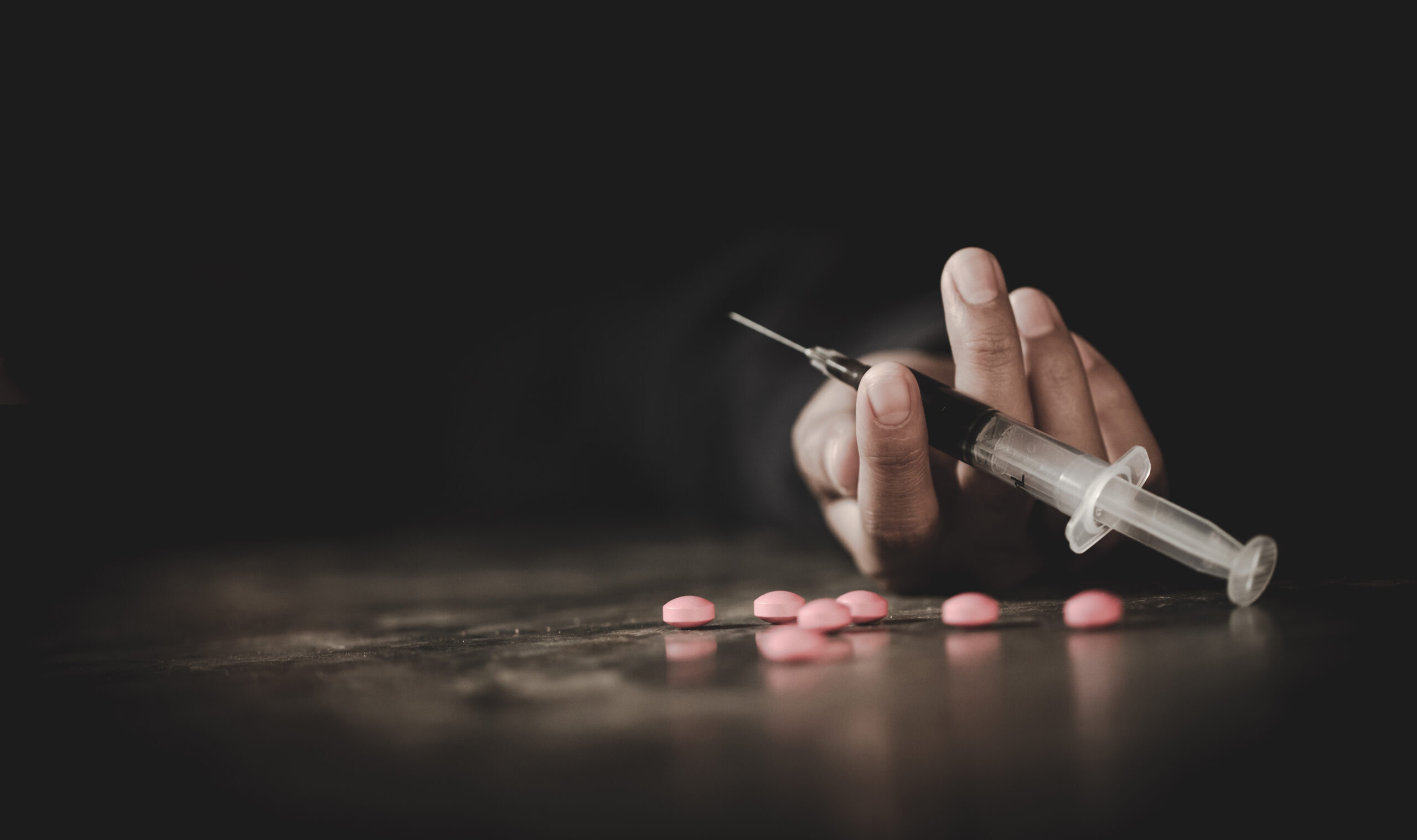On Drugs, Vivek, War is Love
As a war on drugs voter, I want to hear how a presidential candidate would use executive power to curb the flow of drugs into this country, because tackling demand alone will never be sufficient.

Vivek Ramaswamy is, without a doubt, charismatic and persuasive, and often hits all the right points. Yet coming out in favor of maintenance treatment and decriminalization of illegal substances is a deal-breaker for me.
Fox News reported that in June, Ramaswamy described his position on drug policy as “You don’t hear me talk about the war on drugs. I’m not a war on drugs person,” adding, “I think in the long run, and I’m talking about over a long run period of time, decriminalization, serially, is an important part of the long run solution here…That’s gotta be part of the solution[…]”
I happen to be raising my family in the San Francisco Bay Area, one of the regions hardest hit by the fentanyl epidemic, and I am very much a war on drugs kind of voter.
That the United States fought the war on drugs and lost is an oft repeated falsehood. Setting aside the fact that the phrase “war of drugs” is just a figure of speech signifying robust law enforcement, the pattern with our nation is that we didn’t lose wars, but sabotaged them from within. In this case, we surrendered our mission to the hedonistic New Left.
The 1960s, anarchists adopted a program of cultural revolution in which mind-bending drugs were a key component. Domestic terrorist organization Weather Underground broke LSD guru Timothy Leary out of prison. Weather Underground alumni eventually settled in academic and nonprofit positions, training future activists and politicians. For a short while, the son of once-incarcerated domestic terrorists, Chesa Boudin, became the district attorney in San Francisco. He fit right in within the political culture that views addiction as a lifestyle choice which must be respected regardless of the consequences to society.
Since the 1960s, San Francisco—and California in general—has spiraled deep into the harm reduction model, limiting punishments for possession and public consumption of illicit substances, supplying users with paraphernalia, tents, and monthly cash stipends. For a few months in 2022, the city operated an unsanctioned “safe consumption” site where addicts were dealing and using drugs under the supervision of city employees, and in the plain view of everyone. According to harm reduction doctrine, these actions are necessary to keep the user alive until he chooses sobriety. It’s a daring idea. And if it seems counterintuitive, that’s because it is.
We locals often say that San Francisco is the place where junkies come to die—maintaining a habit here is convenient; quitting is hard work. So, they stick around for their short lifetimes. 2023 is on track to set a new record for deadly drug poisonings, with 121 suspected “overdose” emergency calls placed on Pride weekend alone. Eighteen users are reported to have died of suspected overdoses this past Wednesday, August 30.
Since drug addiction is not a victimless crime, the lenient approach has created entire neighborhoods littered in syringes and human excrement, made public transit unusable, and contributed to the “doom loop” of population and business outflow. The Union Square cable car terminal used to be a busy and noisy place where families lined up to take the scenic ride. It is now a void of boarded up storefronts. A few months ago, a frightened security guard shot a homeless shoplifter a block away from the former tourist spot.
San Francisco is not the only American city facing social and economic collapse: Portland, Seattle, Philadelphia, and many others have their own no-go zombielands. With over one hundred thousand yearly drug poisonings taking American lives in their prime, the proliferation of hard drugs is one of the top problems facing the nation, and I expect a Republican presidential candidate to address it with a sense of urgency.
Ramaswamy doesn’t seem to have a vision for it. In an attempt to limit the fallout from the Fox expose, he explained himself: “More planted trash. I support decriminalizing ayahuasca & ketamine for veterans suffering from PTSD, to prevent the epidemic of fentanyl & suicide. It’s pathetic that Establishment candidates are using lies as a substitute for a message. When you strike the swamp, the swamp strikes back.”
Ketamine is a Schedule III drug and already legal for medical use. Is Ramaswamy running for president to expand the prescription of ketamine to one additional diagnosis? I think not. The big picture he painted is different. He gave his audiences a blueprint for gradual legalization of all drugs, starting with a controversial treatment for veterans and moving on to addicts.
He appears to be endorsing maintenance treatments, or government-dispensed and/or administered drugs for those who already developed the habit. So-called “safe consumption sites” are a variation on this idea. Unlike abstinence, this approach creates lifetime pharma patients and, as libertarians should acknowledge, expands the role of government in private lives.
It’s worth mentioning that California Governor Gavin Newsom, who is very much running for the Democratic nomination, recently vetoed a bill that would legalize such joints. That puts Ramaswamy to the left of Newsom on the issue of addiction.
Lost amidst Ramaswamy’s self-congratulation for being the only Republican candidate in favor of decriminalization is the fact that decriminalization of hard drugs has failed everywhere it was tried. Portugal was the latest overhyped “success” story. Michael Shellenberger explained in his seminal work San Fransicko that the pro-opiate lobby misrepresents Portugal, as the Iberian country compels addicts to enter treatments under threat of a prison term—a far cry from decriminalization.
Even so, Portugal is now forced to rethink its decades-long policy. The traditionalist, homogenous Portugal has the same illegal drug issues as the U.S., albeit on a smaller scale: Rising use, rising crime, demoralized law enforcement, sprawling encampments—thankfully away from the tourist destinations.
Our own marijuana legalization, now enacted in many states as a step towards eventual legalization of all drugs, is no shining example of success. Americans were promised that pot is harmless and even medicinal, and that crime would decline. It turned out that highly concentrated cannabis sold at dispensaries is addictive and linked to psychosis, and that panic attacks are common, along with a myriad of other psychological and physiological side-effects. Out of hundreds of chemical ingredients found in a marijuana plant, only CBD has shown to be useful in medical practice. There is no need to legalize cannabis to manufacture CBD extract.
Decline in criminal activity stemming from the drug’s sale and distribution was another empty promise. Cartels continue dealing the drug—and grow it stateside. And while the proponents of legal cannabis argue that such pathologies proliferate because cannabis remains illegal on the federal level and that the state industry is overregulated, deregulating a weed that can be grown in any home next to a basil plant would drastically reduce the price and make the dangerous substance even more readily available. The consequences to our society would be tremendous, and, with deregulation and falling prices, states would miss out on hundreds of millions in tax revenue.
In his op-ed on foreign policy for The American Conservative, Ramaswamy explained that his goal is peace. Well, the streets of so many of our cities look like war zones full of defeated men. China, our number one geopolitical foe, is supplying components of the drug that is killing them, but it’s our domestic policies that make it easy for China to do so. Under decriminalization and harm reduction protocols, drugs became cheap and easy to procure, and social restraints are next to non-existent. It’s no wonder that use has skyrocketed.
Addressing the demand side is important. We need new and better treatments for the increasingly more addictive and deadly substances that now reach American markets. We also need to signal to potential users that their transgressions will not be tolerated, that there will be severe criminal penalties for the sociopathic behavior that is now destroying our great cities.
Above all, as a war on drugs voter, I want to hear how a presidential candidate would use executive power to curb the flow of drugs into this country, because tackling demand alone will never be sufficient. We will never curb drug addiction without going after the supply lines.
The post On Drugs, Vivek, War is Love appeared first on The American Conservative.
Shop For Night Vision | See more…
Shop For Survival Gear | See more…
-
Sale!

Japanese 6 inch Double Edged Hand Pull Saw
Original price was: $19.99.$9.99Current price is: $9.99. Add to cart -
Sale!

Tactical Camo Nylon Body Armor Hunting Vest With Pouch
Original price was: $49.99.$39.99Current price is: $39.99. Select options This product has multiple variants. The options may be chosen on the product page -
Sale!

Quick Slow Release Paramedic Survival Emergency Tourniquet Buckle
Original price was: $14.99.$7.99Current price is: $7.99. Add to cart


















































